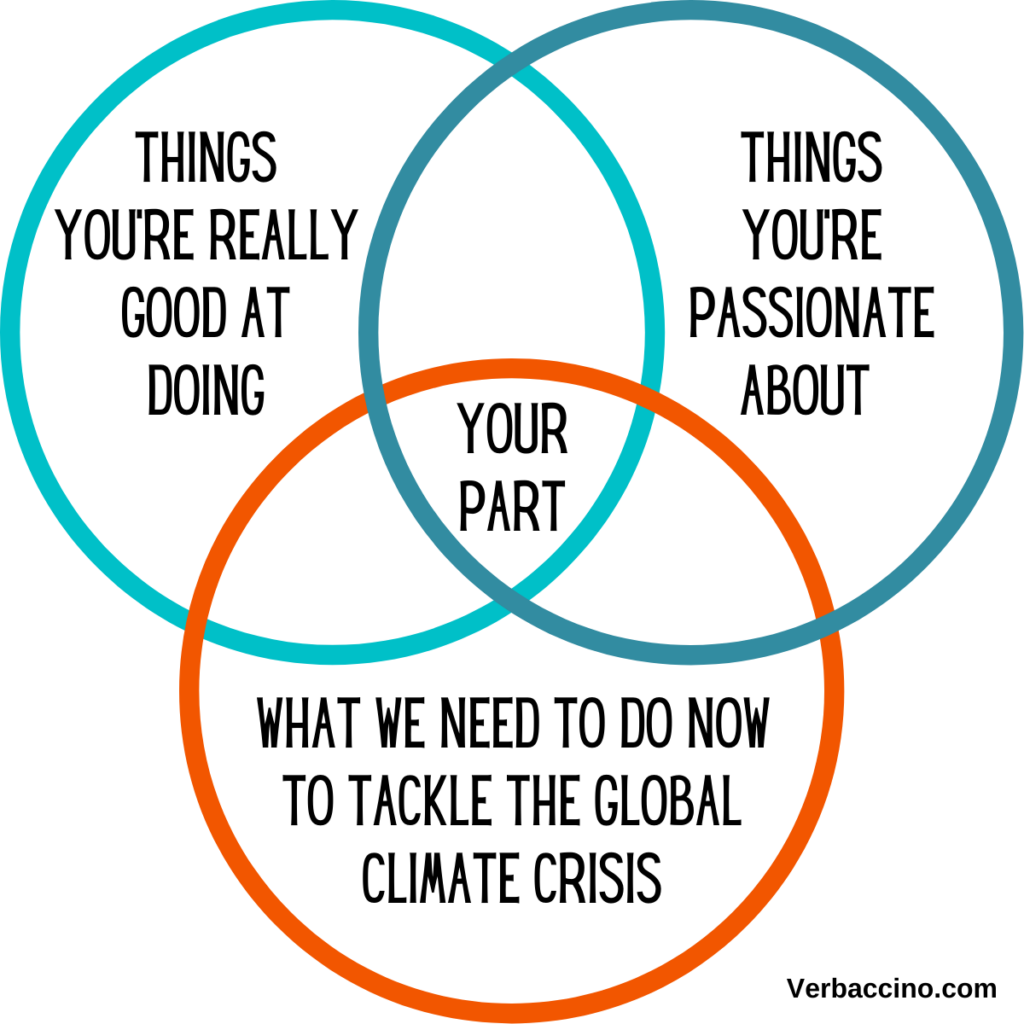Have you been following climate news stories lately? It’s kind of hard not to, if you follow the news at all. Parts of the planet are on fire, others are drowning under catastrophic rain falls. No matter where you live, it seems the weather is becoming more unpredictable by the year. Maybe you’ve also read the recent IPCC report “Summary for Policy Makers”? (Or tried to – it’s not light reading, to be sure.) If you have, then maybe you’ve found yourself struggling with feelings of doom… and I completely empathize.
It’s tempting to thow up our hands in despair, or even ignore climate news stories completely, when they’re not happening to us. Climate change is such a huge, complicated issue, and it can feel overwhelming, to say the least.
But as the mother of a bright, talented 17-year-old who is about to go off to university, I can’t just give in to fatalism. I refuse to. My only child is starting the next big chapter in her life, and I want her to be as excited as I was at that juncture – excited to be a first-year student, to follow her academic interests and personal passions, to make new friends, maybe fall in love, to explore her professional options… all of it. I want her to look forward to what’s ahead and feel hopeful about the future.
So how do I reconcile that with everything I’ve been reading about climate change? The science is soberingly clear: to ensure a liveable planet for our kids and grand-kids, we have to make systemic changes to our global economy, and we have to do so URGENTLY.
Governments around the world, corporations of all sizes, individuals in every capacity – we all need to start pulling in the same direction to quickly and permanently reduce CO2 and other greenhouse gas emissions. We can’t recycle or carbon-offset our way out of this. What we need to do is wean our economy off fossil fuels and transition to clean, sustainable energy sources ASAP. We can’t afford to wait another decade or two, not if we want to avoid worst-case climate-change scenarios.
The good news is: we already have the technologies to make the transition to a green, net-zero economy. We just need the collective will to implement them. It’s not about changing individual habits and behaviours, it’s about making SYSTEMIC changes through collective action.
As it turns out, that’s the best thing you can do to counter feelings of doom: take ACTION. And I don’t mean working on reducing your personal carbon footprint. We should all make an effort, of course. But even if every person on the planet switched to a meatless diet tomorrow, even if none of us ever booked another plane ticket, and if every gas-fueled car were replaced by an electric vehicle overnight, it still wouldn’t make a big enough difference. What we need at this point is for clean, renewable energy sources to become the global default, and for fossil fuels to be phased out.

OK, so what can we do as individuals? A lot. First of all: we can face the issue head-on and get as informed as possible. Next: we can each figure out how we can best contribute to making systemic change. I’ve found it helpful to think of a Venn diagram, like the one above. Think about:
1. the things you’re really good at (i.e. where you’re most effective)
2. the things you’re really passionate about (so you stay motivated)
3. the things we need to do to tackle the global climate crisis
How do those three circles intersect, in your case? Which activities fit into the middle of the diagram? That’s how you can best contribute. That’s your part.
Imagine if all of us started doing our part. Imagine how quickly things would change for the better. That’s what movements are made of. And movements change the course of history.
For myself, I’ve spent the past few months thinking about what kinds of clients I really want to work with as an independent marketing consultant. Which companies would I most like to help, if I had the choice? (And hey, I do have the choice!)
I’ve come to the conclusion that I want to work with companies in the Cleantech & Sustainability sector. With my communications skills and global marketing know-how – combined with my passion for language, culture and sustainability issues – I want to help Cleantech companies that are ready to launch their solutions into international markets. In that way, I hope to do my part towards the transition to a green global economy within my lifetime.
So that’s Verbaccino’s new mission: to help Cleantech companies go global. Because the climate crisis is global and our response needs to be as well. You can download Verbaccino’s one-page pitch PDF here.
Have you been thinking about the global climate crisis and what you could possibly do to take action? Tell me all about it! I’d love to hear from you.
Cheers,
Kathrin Bussmann
President & Chief Strategist at Verbaccino Inc.
